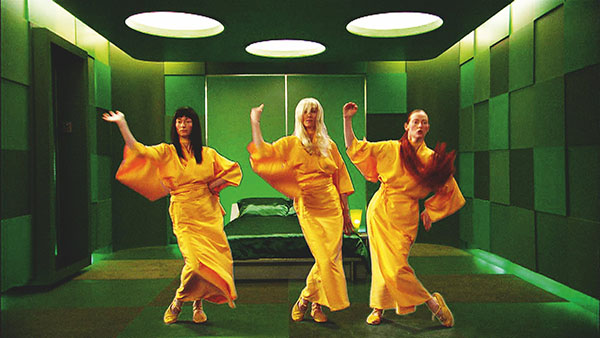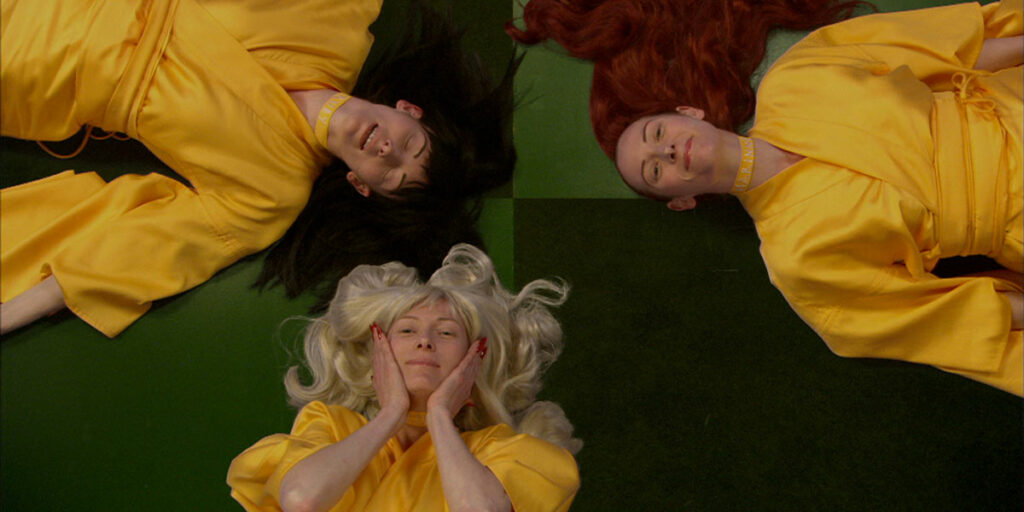Teknolust is a charming, offbeat sci-fi feature that explores the search for love and connection in a world being changed by AI, cloning, and digital tech.
“Loneliness lives on our net frontier,” says Ruby, a digital lover on an internet portal. “Even motherboards and flash require touch. Think of passion each time you click me into you. E-dream with me before you crash.” To her audience, the seductive Ruby only exists on a computer screen. However, Ruby is very real, but just not who anyone would expect her to be.
Ruby is the creation of Dr. Rosetta Stone (Tilda Swinton), a biogeneticist who has attempted the impossible by combining her DNA with her artificial intelligence experiments. Her creations, known as SRAs (self-replicating automatons), represent remarkable scientific breakthroughs as she’s successfully discovered how to clone and asexually reproduce human DNA into sentient beings. Each of the three SRAs (also played by Swinton) exhibit unique personalities—Marinne is distant yet free-spirited, Olive is pragmatic and mature, and Ruby is the most adventurous, as she often wanders into the real world while the other two stay behind. Rosetta keeps the SRAs under close watch (from a screen on her microwave) at her house, as she’s keeping them a secret from her unsuspecting colleague Crick (John O’Keefe) and the rest of the world.
In order to survive, the SRAs need male chromosomes from sperm, which Ruby gathers from spontaneous sexual encounters with random men she meets. Soon, the men she’s had sex with all begin exhibiting strange symptoms, as numbered barcodes appear on their foreheads and computers crash at their touch. Unbeknownst to them, they’ve been infected with a computer virus from Ruby. As more cases are reported and the patients are quarantined together for medical examination, a government agent named Hopper (James Urbaniak) begins an investigation, with the help of the eccentric detective Dirty Dick (Karen Black). Meanwhile, as Rosetta tries to keep her experiment a secret, the SRAs begin to exhibit more independence and curiosity about the outside world, especially Ruby, as she seeks to experience something more fulfilling than just sex.

Teknolust is the second feature film from Lynn Hershman Leeson, a San Francisco-based multimedia artist and filmmaker. Leeson’s film is an ideal and accessible introduction to her intriguing body of work which centers around human-technology interaction, digital cultures, biotechnology, surveillance, identity, and gender. It’s a rich science fiction film, exploring the consequences of emerging technologies like cloning and AI, in a society that is still catching up to the rapid transformations of the digital era. While the computer graphics and hardware seen onscreen look primitive by today’s standards, the world of Teknolust still serves as a relevant reflection of our own world, as we too are still adjusting to lifestyles becoming more and more governed by digital technologies. While we normally associate AI with computers, Leeson offers a unique premise of AI rendered tangible through cloning and asexual reproduction. Teknolust gives us lots to ponder beyond its 83-minute runtime, inviting us to consider the ramifications of what might happen if AI beings could physically interact with the world and experience touch, emotions, sexual contact, and even love.
Viewers will no doubt be struck by the film’s unique performances. The magnificently chameleonic Tilda Swinton plays not one but four characters: the eccentric (and wonderfully named) Rosetta Stone, as well as her three SRAs. She brings remarkable range to the film, giving each of her four roles distinct personalities and it’s a joy to watch them interact onscreen. Other standout performances are Jeremy Davies as the socially awkward photocopier Sandy who falls in love with Ruby, James Urbaniak as the stiff and cold Hopper, and Al Nazemian as Doctor Bea, who whispers all of his dialogue to the viral patients he examines. When asked about the unconventional performances in the film, Leeson explained that she drew inspiration from 70s feminist theater performers who rejected traditional stage performance styles and created their own. This is likely where Teknolust may lose some viewers—these performances are certainly jarring, yet they give the film a beautifully idiosyncratic and memorable personality.
Leeson plays around with genre too—and seems to be having lots of mischievous fun with that. On paper, it’s easy to see Teknolust as an erotic biothriller about a seductive AI clone unknowingly spreading a technosexual disease around the unassuming men of San Francisco—yet the film denies us the sensational pleasures and thrills of that premise. The retrofuturistic “cyber-kitsch” aesthetic, something like early 2000s high-tech digital culture meets the bright color palette of an Almodóvar film, cleverly contradicts this dystopian angle to the story and instead bathes it in a light, campy tone. At its core, Teknolust is the story of its aloof and curious characters navigating a world being changed by powerful new technologies, as they search for fulfilling personal connection, whether that be sex or love.
Teknolust is best watched with an open mind, especially for its unabashedly kitschy and unorthodox formal approach. It’s not to be taken too seriously, as there’s lots of amusing moments to be found here, some that quietly yet cleverly capture the nature of curiosity and human interaction. While it’s easy to see this simply as a curio of its time, a ludicrous depiction of what the early 2000s thought the future might look like, Teknolust remains surprisingly relevant 20 years later, as we too, like Ruby, Rosetta, and Sandy, are trying to navigate a technologically changing world and seek meaningful connections with each other.
Teknolust is now available to watch on MUBI, as part of the streaming service’s “The One and Only: Tilda Swinton” retrospective.

